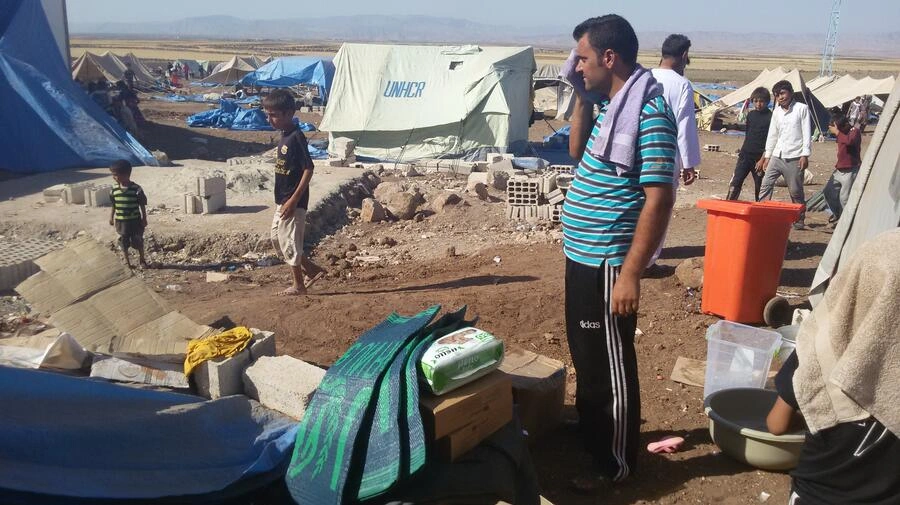The Kurdistan Region is currently facing a surge in tensions following controversial remarks by a Yazidi commander, leading to widespread backlash. Both religious and governmental leaders emphasize the need for tolerance, peaceful coexistence, and legal accountability, while efforts to calm the situation continue amid fears of violence and displacement among the Yazidi community.
Backlash Over Controversial Remarks
In recent days, the Kurdistan Region has witnessed a significant outcry, particularly across social media platforms, in response to an erroneous remark made by a prominent Yazidi figure. The Presidency of the Kurdistan Region has underscored the importance of respecting all belief systems and religions, denouncing any form of violation or disrespect as intolerable. The controversy erupted after a speech by Qasim Shasho, the Yazidi commander of the Peshmerga forces in Shingal, where he made a statement perceived as offensive towards Islam. In his speech at the Sharafaddin shrine, marking the 10th anniversary of the ISIS attack on Shingal, Shasho remarked, “As long as Mohammed and his religion exist, attacks and massacres against Ezidis will continue,” a statement that sparked widespread protests and led to five legal complaints against him.
The Presidency of the Kurdistan Region emphasized that the error committed by an individual should not be generalized to the entire religious community. Instead, it called for a culture of mutual acceptance, tolerance, and peaceful coexistence, urging efforts to prevent hate speech. The authorities have been tasked with conducting a legal inquiry and holding individuals accountable, reaffirming the region’s commitment to being a model of peaceful coexistence, without justification for instigating disorder or endangering citizens and communities.
Response from Yazidi and Islamic Leaders
In response to the controversy, the Spiritual Leader of the Yazidis in Iraq and worldwide reassured Muslims that the remarks by Shasho were not intentional. During a meeting with the Kurdistan Regional Government’s Minister of Endowments and Religious Affairs and the Kurdistan Islamic Religious Scholars Union, the Yazidi leader emphasized that one of the sacred principles of the Yazidi religion is to respect the sanctity of other religions. He highlighted that there is no distinction between religions and that tolerance is a sacred principle, urging the public not to misinterpret the remarks.
Yazidism, an ancient monotheistic religion with roots in the Middle East, teaches respect for all religions. The Yazidi leader’s reassurance aimed to ease tensions and affirm the community’s commitment to peaceful coexistence with Muslims, a relationship that has spanned centuries. However, the controversy has led to significant unrest within the Yazidi community, particularly among those residing in camps within the Kurdistan Region.
Displacement and Legal Repercussions
Following the backlash, hundreds of Yazidi families have begun leaving displacement camps in the Kurdistan Region, particularly in Dohuk Governorate, fearing repercussions from the ongoing controversy. Reports indicate that these families are returning to Sinjar, a region still recovering from the devastating ISIS attacks of 2014. Despite assurances from camp managers that there is no immediate danger, fear and anxiety have driven many Yazidis to return to their ancestral lands, even without completing official procedures.
The controversy has also resulted in legal action against Qasim Shasho, with the Nineveh Investigation Court issuing an arrest warrant against him on charges of insulting the Prophet and inciting inter-religious strife. This action is based on Article 195 of the Iraqi Penal Code, which prescribes severe penalties for actions aimed at inciting sectarian violence or civil war. The legal proceedings underscore the seriousness of the situation and the potential for further escalation if not handled with care.
Calls for Unity and Coexistence
Amid the escalating tensions, religious and governmental leaders continue to call for unity, tolerance, and peaceful coexistence. Abdullah Mullah Saeed, president of the Union of Islamic Scholars, reiterated the importance of respecting all religions and their symbols, emphasizing that the actions of one individual should not tarnish the reputation of an entire religious community. The Union has pledged to address any actions that threaten the coexistence of different communities within the Kurdistan Region and to prevent such incidents from recurring.
The Yazidi community has also issued a statement condemning the hate speech and threats that have emerged in the wake of Shasho’s remarks. They stressed that the situation was caused by an unintended statement that was misinterpreted, leading to a wave of hostility, particularly on social media. The community’s statement emphasized the rejection of any insult to religions and the need to respect all beliefs and sanctities.
Efforts to calm the situation have been supported by the highest Shiite authorities, the Union of Religious Scholars, and other parties committed to maintaining peace and stability in the region. The Kurdistan Regional Government, along with the Iraqi government and the international community, has been called upon to protect Yazidi citizens and ensure their safety amid the ongoing crisis.
The controversy surrounding Qasim Shasho’s remarks highlights the fragility of religious and ethnic coexistence in the region and the importance of fostering a culture of tolerance and mutual respect. As tensions continue to simmer, the actions of religious and governmental leaders will be crucial in determining the future of peace and stability in the Kurdistan Region.


